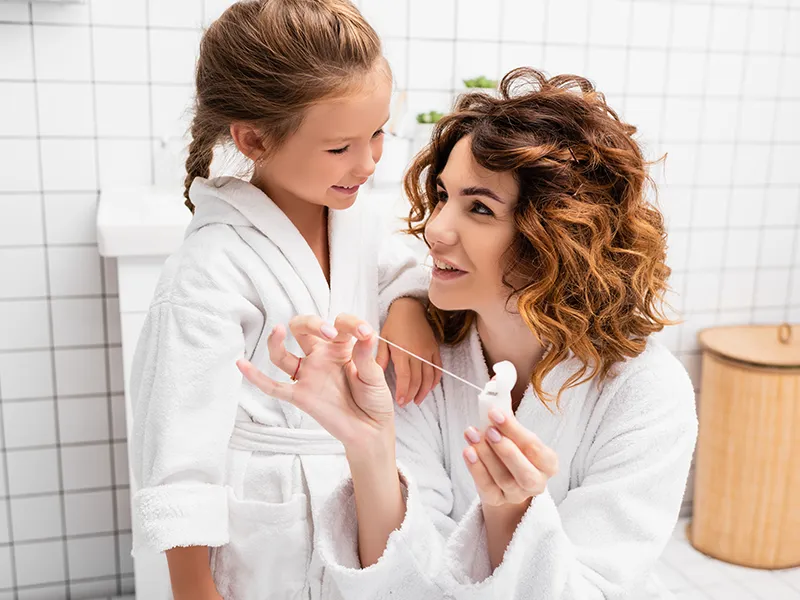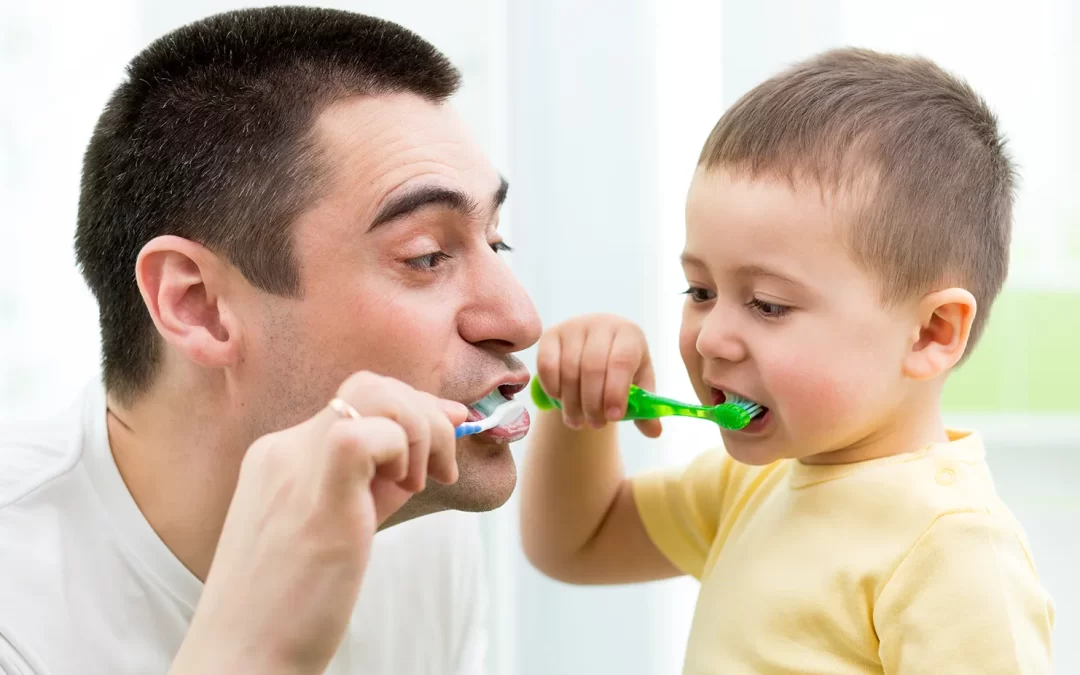Be a brushing buddy
If you have an infant or a toddler, they will typically rely on you to maintain their oral health. Sometimes it takes a little extra determination to get those gums clean! At the beginning of this stage, for very young infants without teeth, gently wipe their gums after feedings with a clean, damp washcloth/gauze. Once your baby has their first tooth, use a small, soft toothbrush with just water and no toothpaste.
For children aged 18 months to 6 years, use a pea-sized amount of children’s toothpaste with fluoride. Ensure your child can spit out the toothpaste before using it. Parents need to supervise this brushing stage closely. For children over 6 years old, switch to a small, pea-sized amount of adult toothpaste. Supervise or assist with your child’s brushing until they are around 8 years old to make sure their habits and techniques are constantly improving.
As they grow older, keep leading by example, showing them how to brush properly until they become coordinated enough to do it themselves. Kids learn best when they are following their role models. Brush your teeth alongside your child! It isn’t just about keeping an eye on them; it’s about creating a fun, bonding experience. Turn it into a nightly ritual, sing goofy songs together or even have a friendly competition to see who can create the most bubbles.
Make flossing fun
At first, flossing might seem scary for your kid, but you can turn it into a quest as you seek out any sugar bugs hiding between their teeth! Start introducing flossing as soon as your child’s teeth start to touch each other. Begin by gently demonstrating the technique on yourself, then guide your child through the process. As they become more capable, encourage them to floss independently.
Positive reinforcement and adding the playful element of making it a hunt brings a new dimension to it. Hunting down all the sugar bugs so you can achieve a clean mouth is so much more meaningful than ‘checking the box’ of flossing. You may like to even explore flavoured floss options to make it more enticing.

Teach proper cleaning techniques
Guide your child to master the proper brushing method, ensuring they cover all surfaces of their teeth, including the back and along the gumline. Demonstrate how to use gentle circular motions for the inner and outer surfaces of the teeth, holding the brush at a 45-degree angle to the gums. When cleaning the biting surfaces, use short strokes back and forth. Emphasise the importance of brushing methodically, which requires at least 2 minutes of brushing time to effectively clean each portion of the teeth.
When it comes to flossing, demonstrate the technique by gently wrapping the floss around your fingers, feeling the smooth texture. Then, slide it carefully between each tooth, forming a C shape and gently scraping the sides. Encourage your child to floss between all their teeth, including the hard-to-reach ones at the back. Child-friendly flossers or floss picks can make the process easier and more engaging, so don’t be afraid to try new things!

Go for nutritious meals
As their parent, you significantly influence mealtimes. Steer them towards healthier choices that support growing smiles. Encourage the consumption of fruits, vegetables and dairy products, as they are beneficial for strong teeth. Limit sugary treats, which can harm their oral health. Transform snack time into a fun and nutritious adventure with chopped veggies and yoghurt parfaits. Make healthy eating exciting for your child!
Maintain regular dental visits
In addition to healthy dental habits at home, regular dental check-ups and cleanings are crucial for your child’s oral health. Your child should have their first dental visit when their first tooth erupts or before their first birthday, whichever comes first. Scheduling these appointments together creates a positive association with the dentist’s office, making future visits more comfortable. Attending check-ups at least twice a year, or more often if your child needs it, ensures healthy teeth and gums and instils lifelong habits of proactive dental care.
Before your child jumps into the excitement of contact sports, a visit to your dentist is a smart move to ensure their mouth is healthy and prepared. A dental check-up can identify any underlying issues and recommend a custom-fitted mouthguard—a shield designed to absorb impact and safeguard your child’s smile from unexpected knocks and tumbles. With a healthy mouth and optimal protection, your child can enjoy the thrills of contact sports with confidence (and your peace of mind!).
Choosing the right product for tiny smiles
Age appropriateness: Ensure the toothbrush is suitable for your child’s age. For infants and toddlers, choose a soft-bristled toothbrush with a small head designed for their delicate mouths. As they grow older, consider transitioning to toothbrushes with slimmer handles and softer bristles to accommodate their developing dexterity and maturing mouths.
Fluoride content: Look for childrens’ toothpaste products that contain fluoride, a mineral that strengthens teeth and fights cavities. Your dentist will be able to advise you on the appropriate fluoride level for your child’s specific needs, taking into consideration their oral health condition, and other factors like water fluoridation and supplementation. If your child is able to spit after brushing, begin using a pea-sized amount (around 0.25 grams) of fluoride toothpaste on the toothbrush. Monitor your child as they spit and rinse afterwards, to ensure they expel the toothpaste. Proper spitting and rinsing will prevent their fluoride intake exceeding the beneficial range that your dentist recommends for optimal oral health.
Flavour and texture: Choose toothpaste flavours that appeal to your child, such as strawberry, grape or bubblegum, to make brushing more enjoyable. For some children, mint can taste too spicy, so a milder flavour might be preferable. There are even flavourless options available. Additionally, consider textured toothbrushes or flossers with fun designs to make cleaning teeth a playful experience.
Safety first: When it comes to your child’s oral health, safety is paramount. Look for dental cleaning products with the seal of approval from reputable organisations like the Australian Dental Association (ADA) or other recognised regulatory bodies in your region. These approvals ensure the products are age-appropriate and free of harsh abrasives or potentially harmful ingredients if swallowed.
Educational value: Some dental cleaning products cleverly incorporate educational features to make oral care more engaging for children. Interactive toothbrushes, for example, can play motivating songs or display timers that ensure they brush for the recommended two minutes. These features make brushing fun and subtly teach children the importance of proper brushing duration, fostering healthy dental habits from a young age.
Building healthy smiles together
Leading the way for your child to develop healthy dental habits takes time and patience. Celebrate every step of your child’s progress with enthusiasm and warmth. Be their greatest coach, offering words of encouragement and support as they learn and grow. Your child’s beautiful smile is one of the best parts of parenthood, so lead with a strong example, a guiding hand and unending positivity.
Bring your best to the routine, with fun songs or playful routines and you can transform brushing and flossing into enjoyable experiences. With your commitment and positive reinforcement, your child will develop great habits and lovely core memories they will hold in their hearts forever.



